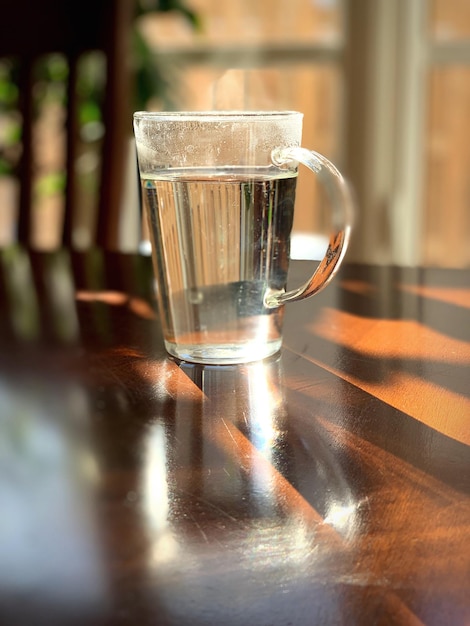The Vital Role of Hydration: How Much Water Do You Need?

Hydration is crucial for overall health, affecting everything from energy levels and cognitive function to organ health; the daily water requirement depends on individual factors like activity level, climate, and diet, but general guidelines suggest aiming for at least eight glasses a day.
Maintaining proper hydration is essential for optimal health. But how much water do you really need each day? Understanding the role of hydration in overall health: how much water do you really need each day? is key to feeling your best and supporting your body’s vital functions.
Why Is Hydration So Important?
Hydration is far more than just quenching your thirst. Every cell, tissue, and organ in your body needs water to function correctly. From regulating body temperature to transporting nutrients, hydration plays a pivotal role in maintaining overall health.
Let’s delve into some of the key functions that rely on adequate hydration:
Essential Functions of Water in the Body
- Temperature Regulation: Water helps maintain a stable body temperature, preventing overheating and ensuring optimal enzymatic activity.
- Nutrient Transport: Water carries nutrients to cells, ensuring they receive the necessary fuel for energy production and repair.
- Waste Removal: Water helps flush out waste products through urine and sweat, supporting kidney function and detoxification.
- Joint Lubrication: Water lubricates joints, reducing friction and promoting flexibility.
Dehydration can lead to a range of negative consequences, from mild fatigue to more serious complications affecting kidney function and cardiovascular health. Adequate hydration, on the other hand, keeps your body functioning smoothly and efficiently.
In conclusion, understanding the role of hydration extends beyond simply drinking when thirsty. It’s about recognizing the foundational importance of water for nearly every bodily process, affecting everything from physical performance to cognitive clarity. Hydrating adequately ensures these processes run smoothly, contributing significantly to overall well-being and long-term health.
How Much Water Do You Really Need?
Determining the precise amount of water you need each day isn’t a one-size-fits-all calculation. While the “eight glasses a day” rule serves as a general guideline, individual needs vary based on several factors. Let’s examine these factors to help you better gauge your personal hydration requirements.
Several elements influence how much water your body needs. Understanding these factors can help you tailor your fluid intake for optimal health:

Factors Influencing Water Needs
- Activity Level: Exercise increases fluid loss through sweat, necessitating higher water intake to replenish lost fluids.
- Climate: Hot and humid environments lead to greater sweat production, demanding increased hydration to avoid dehydration.
- Diet: Certain foods, like fruits and vegetables, contribute to fluid intake, while others, like salty snacks, can increase water loss.
- Health Conditions: Certain medical conditions, such as diabetes or kidney problems, may affect fluid balance and require adjustments in water intake.
Beyond simply drinking water, you can also increase your fluid intake through other beverages and water-rich foods such as watermelon, cucumbers, and soups. Listen to your body’s thirst cues, and adjust your water intake according to your activity level, the climate, and your individual health needs to maintain optimal hydration.
Personalized approaches to hydration involve considering the many variables that impact fluid needs. By being mindful of activity levels, environmental conditions, dietary choices, and health status, individuals can tailor their water consumption to maintain optimal bodily functions and overall well-being. Paying attention to these factors is important for a proactive and informed approach to hydration.
The Signs of Dehydration: What to Watch For
Recognizing the early signs of dehydration is essential for maintaining optimal health. Dehydration occurs when your body loses more fluids than it takes in, disrupting normal body functions. Being aware of these signs allows you to take prompt action and prevent more serious health consequences.
Here are some common indicators that you may be dehydrated:
Common Signs of Dehydration
- Thirst: The most obvious sign of dehydration, signaling your body’s need for fluids.
- Dry Mouth: Reduced saliva production leads to a dry and sticky sensation in the mouth.
- Dark Urine: Concentrated urine with a darker color indicates reduced fluid volume in the body.
- Fatigue: Dehydration can cause fatigue and weakness due to reduced blood volume and nutrient delivery.
In addition to the common signs, dehydration can also cause headaches, dizziness, and constipation. Monitoring these indicators and proactively increasing fluid intake can help prevent dehydration from becoming a more serious issue.

By regularly checking for signs of dehydration, individuals can maintain proper fluid balance and prevent negative health outcomes, ensuring their bodies operate optimally. Timely attention to these indicators contributes to overall health and well-being.
Health Benefits of Staying Properly Hydrated
Optimal hydration contributes significantly to numerous aspects of health, impacting physical performance, cognitive function, and the prevention of certain medical conditions. Ensuring adequate fluid intake can lead to tangible improvements in overall wellness.
Here are some of the key health benefits associated with proper hydration:
Key Benefits of Staying Hydrated
- Improved Physical Performance: Proper hydration enhances endurance, strength, and recovery during physical activities.
- Enhanced Cognitive Function: Adequate fluid intake supports concentration, memory, and overall cognitive performance.
- Kidney Stone Prevention: Staying hydrated helps dilute urine and prevent the formation of kidney stones.
- Improved Digestion: Water aids in digestion and prevents constipation by keeping stool soft and promoting regular bowel movements.
Beyond the notable health improvements, staying hydrated can also contribute to better skin health and weight management. Drinking enough water helps maintain skin elasticity and promotes a feeling of fullness, which can help reduce overeating.
In summary, the multifaceted benefits of proper hydration extend beyond basic bodily functions, influencing physical fitness, mental acuity, and preventative health measures. Prioritizing adequate water intake is a simple yet powerful strategy for optimizing overall health.
Tips for Staying Hydrated Throughout the Day
Maintaining consistent hydration throughout the day doesn’t have to be a chore. Incorporating simple habits into your daily routine can make it easier to meet your fluid needs and reap the health benefits of optimal hydration.
Here are some practical tips to help you stay hydrated:
Hydration Habits to Incorporate
- Carry a Water Bottle: Keep a reusable water bottle with you and refill it throughout the day as a visual reminder to drink more water.
- Set Reminders: Use your phone or a hydration app to set reminders to drink water at regular intervals.
- Drink Before, During, and After Exercise: Replenish fluids lost through sweat by drinking water before, during, and after physical activity.
- Infuse Water with Flavor: Add slices of lemon, cucumber, or berries to your water to make it more appealing and encourage consumption.
Making water accessible and varied keeps your hydration routine enjoyable. Experiment with different fruit or herb infusions to find flavors you enjoy, and adapt your strategies to suit your lifestyle and preferences.
In essence, staying hydrated is about creating simple, sustainable habits that integrate seamlessly into your daily life. By making water a central part of your routine, you can maintain optimal hydration effortlessly and enjoy the many health benefits it offers.
Debunking Hydration Myths and Misconceptions
Several misconceptions surround hydration and fluid intake, often leading to confusion about how to stay properly hydrated. Dispelling these myths can help you make informed decisions about your fluid intake and overall health.
Let’s address some common hydration myths:
Common Hydration Myths
- Myth: You should only drink water when you feel thirsty.
Reality: Thirst is a sign that you are already mildly dehydrated. It’s better to drink water regularly throughout the day, even when you don’t feel thirsty. - Myth: All beverages are equally hydrating.
Reality: Some beverages, like sugary sodas and alcoholic drinks, can actually dehydrate you due to their diuretic effects. Water, herbal teas, and fruit-infused water are better choices for hydration. - Myth: You need eight glasses of water every day, regardless of activity level.
Reality: Individual hydration needs vary based on activity level, climate, and overall health. The eight-glass rule is a general guideline, but you may need more or less depending on your specific circumstances.
Differentiating between fact and fiction is critical for making informed decisions about hydration. Personalized approaches to hydration, considering individual needs, are essential for maintaining proper fluid balance and overall wellness. Hydration should be continuous and based on individual health and circumstances.
| Key Aspect | Brief Description |
|---|---|
| 💧 Importance of Hydration | Crucial for bodily functions: temperature regulation, nutrient transport, and waste removal. |
| 🏋️ Factors Influencing Hydration | Activity level, climate, diet, and individual health conditions impact daily water needs. |
| ⚠️ Signs of Dehydration | Thirst, dry mouth, dark urine, and fatigue are common indicators. |
| ✅ Hydration Tips | Carry a water bottle, set reminders, and flavor your water for better intake. |
[Frequently Asked Questions]
▼
The general recommendation is around eight glasses, but it varies. Factors such as your activity level, climate, and overall health influence the amount you should drink.
▼
Yes, but be cautious. Water, herbal teas, and fruit-infused water are good choices. Avoid sugary drinks and excessive caffeine, as they can have negative effects.
▼
Chronic dehydration can lead to kidney problems, digestive issues, and decreased cognitive function. Consistent, adequate hydration is important for long-term well-being and health.
▼
Yes! Water-rich foods like watermelon, cucumbers, and oranges can significantly contribute to your daily fluid intake and also provide essential nutrients.
▼
Even mild dehydration can lead to fatigue, headaches, and reduced mental clarity. Staying consistently hydrated helps maintain good energy levels and mood stability.
Conclusion
Understanding and prioritizing hydration is essential for overall health. By knowing your individual needs and adopting practical strategies to stay hydrated, you can ensure your body functions optimally, promoting physical and mental well-being.





